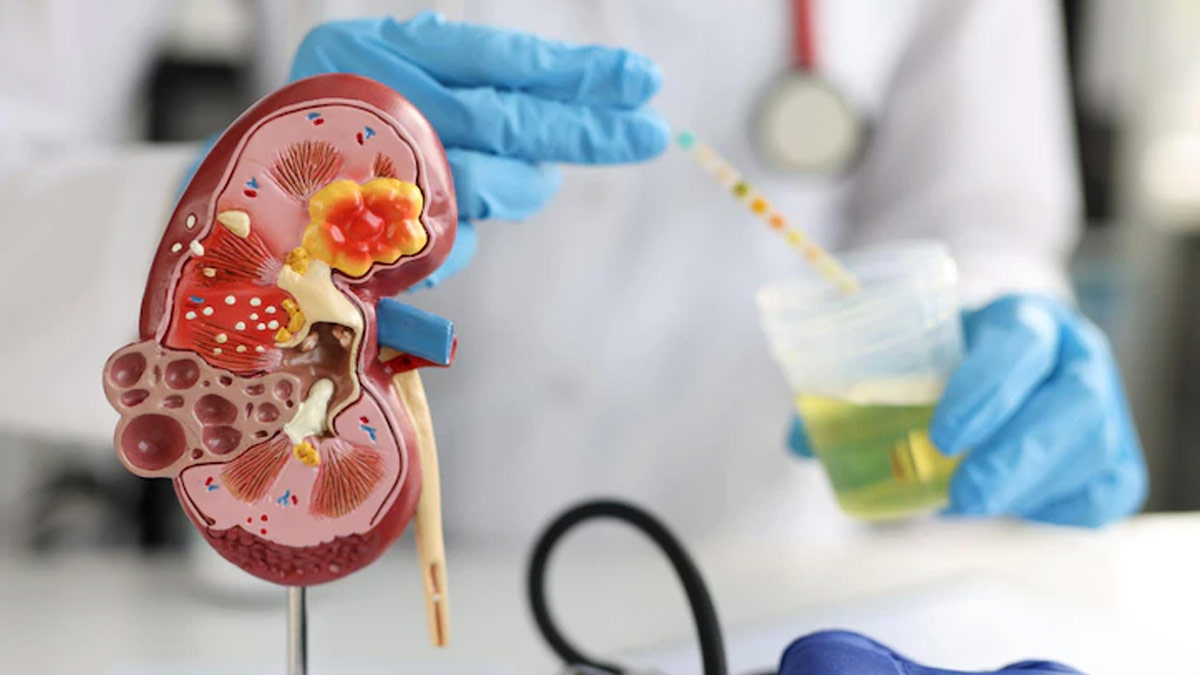
A renal diet, sometimes known as a kidney-friendly diet, is a customised eating plan intended to help people with kidney illness, particularly those on dialysis. This diet is important for maintaining the delicate balance of nutrients while reducing the load on the kidneys. discuss the essential principles of a renal diet, including and limiting foods, and how to maintain a balanced lifestyle for maximum kidney health.
Table of Content:-
What Are The Basics of a Renal Diet
Fluid Management
Controlling fluid intake is important for kidney disease, as impaired kidney function may result in fluid retention. Limiting fluids helps prevent complications such as swelling and high blood pressure.
Also read: Ayurveda For Kidney Health: Expert Lists Seasonal Practices To Follow For Kidney Health
Sodium Restriction
“Sodium can contribute to fluid retention and elevated blood pressure. A renal diet emphasises low-sodium options by choosing fresh, whole foods and minimising processed or canned items,” said Ms Usha Joshi, Clinical Nutritionist at Fatima Hospital, Lucknow.
Moderate Protein In Diet
While protein is essential for the body, excessive protein intake can strain the kidneys. A renal diet focuses on consuming moderate amounts of high-quality protein sources, including lean meats, poultry, fish, eggs, and dairy.
Ms Usha Joshi said, “Consume proteins cautiously. It can help protect the kidneys from inflammation, but only if ingested in moderation. Eating more protein in your diet can make your kidneys work harder.”
Controlling Phosphorus
High levels of phosphorus can lead to bone and heart issues in kidney disease. The renal diet limits phosphorus-rich foods such as dairy, nuts, and processed items. Phosphorus binders may be prescribed to manage levels effectively.
Potassium Management
Impaired kidneys may struggle to regulate potassium levels. A renal diet restricts high-potassium foods like bananas, oranges, tomatoes, and potatoes. Cooking vegetables can reduce their potassium content.
Calcium Intake
Maintaining a balance between calcium and phosphorus is crucial for bone health. The renal diet emphasises low-phosphorus calcium sources like leafy greens and may include calcium supplements if necessary.
Caloric Adjustment
Managing caloric intake is essential for maintaining a healthy weight. Adjusting portion sizes based on individual needs and activity levels is a key aspect of the renal diet.
Also read: Here Are 7 Vegetarian Superfoods That Can Help You Boost Your Kidney Health
Key Foods to Include
High-Quality Proteins
Lean meats, poultry, fish, eggs, and dairy in moderation provide essential amino acids without excessive strain on the kidneys.
Fresh Fruits and Vegetables
Choose low-potassium fruits like apples and berries, and low-phosphorus vegetables such as cabbage and green beans. Cooking vegetables can make them more kidney-friendly.

Whole Grains
Incorporate whole grains like brown rice, quinoa, and whole wheat, which provide fibre and nutrients without high levels of potassium or phosphorus.
Healthy Fats
Opt for heart-healthy fats found in olive oil, avocados, and nuts, while avoiding saturated and trans fats.
Low-Phosphorus Dairy Alternatives
Consider dairy alternatives with lower phosphorus content, such as rice or almond milk.
Foods to Limit
High-Sodium Foods
Processed foods, canned soups, and salty snacks contribute to high sodium levels and should be limited.
High-Potassium Foods
Bananas, oranges, tomatoes, and potatoes are high in potassium and should be restricted in a renal diet.
Phosphorus-Rich Foods
Dairy products, nuts, seeds, and processed foods can be high in phosphorus and should be limited.
Maintaining a Healthy Lifestyle
Stay Hydrated
Adhere to prescribed fluid restrictions and choose hydrating options like ice chips, frozen grapes, or small sips of water.
Regular Monitoring
Schedule regular blood tests to monitor nutrient levels and kidney function. Adjustments to the diet can be made based on the results.
Collaborate with Healthcare Team
Work closely with a healthcare team, including a nephrologist and a registered dietitian, to ensure personalised and effective management of kidney health.
A renal diet is an important component in managing kidney disease and supporting overall well-being. By following these principles and guidelines, individuals can make informed choices to optimise their nutritional intake while minimising the impact on kidney function. Always consult with healthcare professionals for personalised advice tailored to individual health needs.
Also watch this video
How we keep this article up to date:
We work with experts and keep a close eye on the latest in health and wellness. Whenever there is a new research or helpful information, we update our articles with accurate and useful advice.
Current Version